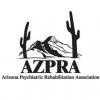You are here
 “Harnessing Spiritual Resources to Successfully Bring About Change” was the theme of this year’s AZ-PRA State Conference, held on September 26 at the Desert Willow Conference Center in Phoenix. Arizona Governor Jan Brewer welcomed the 130+ attendees, recalling the “inadequate” state of Arizona’s mental health services in 1983 when she arrived in the legislature, and how Arizona’s behavioral health system has finally evolved—with the help of Federal litigation brought on behalf of a serious mentally ill individual in the Arnold v Sarn case (filed in 1981; settled in 2014)—to one which can “thoroughly, competently, and compassionately” meet the needs of people who are dealing with mental illnesses in themselves or their families. She said she does not “wear her faith on her sleeve,” but that relying on faith has been one of the ways in which she has dealt with challenges in her own family’s life. She thanked everyone in the audience for the tireless work which they do on behalf of people with mental illnesses, and encouraged us all to keep up the good work.
“Harnessing Spiritual Resources to Successfully Bring About Change” was the theme of this year’s AZ-PRA State Conference, held on September 26 at the Desert Willow Conference Center in Phoenix. Arizona Governor Jan Brewer welcomed the 130+ attendees, recalling the “inadequate” state of Arizona’s mental health services in 1983 when she arrived in the legislature, and how Arizona’s behavioral health system has finally evolved—with the help of Federal litigation brought on behalf of a serious mentally ill individual in the Arnold v Sarn case (filed in 1981; settled in 2014)—to one which can “thoroughly, competently, and compassionately” meet the needs of people who are dealing with mental illnesses in themselves or their families. She said she does not “wear her faith on her sleeve,” but that relying on faith has been one of the ways in which she has dealt with challenges in her own family’s life. She thanked everyone in the audience for the tireless work which they do on behalf of people with mental illnesses, and encouraged us all to keep up the good work.
Keynote speaker Christie Cline, MD, CEO of Zia Partners, then told the poignant story of a family whose good-hearted father struggled with bi-polar illness and alcoholism, and whose mother—a witness and survivor of serious childhood abuse in her own family of origin—made a conscious choice to move away and give her own children the opportunity to grow up differently than the way she did. Eventually, we learned that Dr. Cline was one of those very children. She explained how she used the advantages bestowed upon her by her mother’s choices and by the passion which arose in her own heart from the “untold” story of her family to focus her life’s energies and talents to change other people’s lives for the better. Her point was that choices made in one generation inevitably affect the lives of people in subsequent generations, and that the infinitely varied stories of people’s suffering and triumph must be told if lessons are to be learned from them. She called upon us as healers to use our own stories to inform the work we do in helping others, and it turned out that this theme seemed somehow to have been absorbed by a number of the day’s speakers even before the conference, based on what we all would hear during the rest of the day.
Dr. Dori Hutchinson, PRA’s new Board Chair, was visibly moved by Dr. Cline’s talk as she shared some of her reactions to it, and connected it to the dramatic growth of the recovery workforce’s ability to more effectively reach and connect with countless people—adults and children—whose stories need to be heard. She explained PRA’s goals and some of its historical successes in moving this workforce forward in skill and knowledge development, teaching how best to incorporate the psychiatric rehabilitation field’s emerging research base and practice implications into our efforts as a workforce to listen to these stories and help “the tellers” move forward on their own journeys towards healing and growth.
Mary Jo Whitfield, MSW, who is VP of Behavioral Health Services for Arizona’s Jewish Family and Children’s Services, then brought the focus directly onto children and families, using her many years of experience working with that population to speak about the Adverse Childhood Events (ACE) study and what it has told us about the striking connection between childhood trauma and later disturbances in behavioral and physical health. She drove home the truth that children are not just “little adults,” and that systems of care need to prepare them for lives as successful adults in the community, not just lives as adult recipients of services. With the right kinds of developmentally appropriate “at elbow” support, mentoring and teaching, children and adolescents have demonstrated success in overcoming multiple risk factors from their earlier lives as they grow into young adults who can function interdependently in society. This requires stable, nurturing relationships with caregivers as well as safe opportunities for basic education, career and employment support, and life-skills development which support their personal effectiveness and well-being.
Mary Blake, C.R.E., Public Health Advisor at SAMHSA’s Community Support Programs Branch, was the last speaker before lunch, and similar to Dr. Hutchinson, she reacted to Dr. Cline’s keynote address, opening her remarks by saying that “there is no greater agony than holding an untold story within you.” She then described SAMHSA’s work in pulling together experts and community stakeholders in its effort to develop a working definition of recovery, and its subsequent identification of trauma and trauma-informed care as a current priority at the Center for Mental Health Services. She said that in its broadest sense, trauma results from events, experienced by a person or persons in certain ways, and pertains to the subsequent effects on their functioning. The key question arising among victims of trauma is “why me?” Efforts to answer this become the foundational core around which their beliefs are shaped, and usually involve a sense of shame, which impacts how they see efforts to help them. There also is a paramount need for safety, not only for the survivor but for the helpers as well, and this is where SAMHSA’s focus on an organizational and systems approach takes on critical relevance. The higher-than-previously-thought incidence of trauma needs to be acknowledged, as well as the power dynamics involved, and the crucial need to avoid re-traumatization by the helping systems. Ms. Blake then mesmerized the audience by telling her own personal story quite briefly, and ended her talk by pointing out that she was hired at SAMHSA not because of her trauma history, but because of her ability to do the job well, evidence of which abounded in her talk. She received a standing ovation.
After lunch, Cory Nelson, Arizona’s Deputy Director of Behavioral Health Services, addressed the attendees, asking “how do we know we’re making a difference?” He reiterated the importance of the ACE questionnaire, citing several statistics, including the fact that some 12.5% of young people in Arizona have four or more risk factors identified in the original ACE study. He then traced the history of a “typical” family from the beginning of the parental relationship in high school through the eventual arrival of four children, the not-unusual health, economic and relationship challenges which in this case led to a not-atypical divorce, and the subsequent varieties—good and bad—of the adolescent adjustment and journeys to adulthood taken by the four children of the family. One of the children did end up needing to be followed by a probation officer, but the officer was a good one, and he helped turn this young man around to finish high school, enter the corrections field himself, go on to higher education, and eventually become the Deputy Director of the Department of Behavioral Health Services of Arizona.
It was indeed the first time that our MH Director “told his story” to a group like this, and he reminded us that we each could be that one person who makes the kind of difference in someone’s life that his probation officer made in his. He concluded by saying that he would like to see DBHS be part of a team with us, to make connections and create a system of care in which the paths to collaboration are clear and they encourage us all to try even harder than we originally thought we could.
Kathy Bashor, Director of the AZDBHS Office of Individual and Family Affairs (OIFA), then told her inspiring story of recovery, but directed our attention to the larger story of peer and family involvement in Arizona’s behavioral health system, which she said paralleled her own growth into a person with respect and with hope. She said that she found her voice “through the support of many of you (in the room) whom I have looked up to over the years,” and recalled that once she was given a chance to work in the system she realized that “many of the people who worked in it held the same hopes and dreams that I did.” She said that she developed Arizona Dialogues as a tool to help peers and family members share their differing perspectives with providers and become partners in system change, and reported that there have been over 100 Arizona Dialogues since then. With over 1200 peer supporters now working in the system and able to bill for peer support through Medicaid, Arizona is a national leader in this regard, but has a long way to go. Increased family involvement is the next step which needs to be taken, she asserted, and reported that current efforts by OIFA and in particular staff member Chaz Longwell are underway to develop policies and training programs that will expand the use of family delivered support services throughout the State. Finally, she praised the Raise Your Voice Initiative, and introduced—with help from ASU’s Vicki Staples—the launching of a new partnership between the State Department of Health Services and Arizona State University. This is the Peer Career Advancement Academy, a training and career development project whose purposes are to help prepare peers throughout the state for work in the behavioral system, and to expand the number of different roles which peers can fill within that system. Again, the audience rose in a standing ovation, this time to acknowledge the critical role which Kathy has played as an advocate, role model, mentor and supporter in bringing the voices of peers and family members front and center in DBHS, thus helping to realize the old consumer-movement call for “nothing about us without us!”



